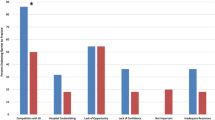Abstract
Introduction
Previous work has shown that up to 30% of graduating surgery residents fail the fundamentals of endoscopic surgery (FES) exam. This study investigated the extent to which FES pass rates differ in a specific sample of individuals who have chosen a career in GI surgery and to examine the relationships between FES performance and confidence in performing flexible endoscopy.
Methods
Fellows attending the 2016 SAGES Flexible Endoscopy Course were invited to complete the FES manual skills examination. Participants also provided survey responses examining demographics, fellowship type, endoscopy curricula in residency, previous endoscopic case volume, confidence in performing endoscopy, and future practice plans.
Results
Twenty-nine (age: 32.24 ± 3.24; 72% men) fellows completed the FES skills examination. Reported fellowships were MIS/Bariatric (41.4%), MIS (24.1%), bariatric (13.8%), flexible endoscopy (6.9%), Advanced GI (6.9%), and MIS/bariatric/flexible endoscopy (6.9%). Almost half (41.4%) had previously participated in a simulation curricula, with 20.7% completing a didactic endoscopy curriculum. Fellows reported performing an average of 110 ± 109.48 EGDs and 77.44 ± 58.80 colonoscopies. The majority (96.4%) indicated that they will perform endoscopy at least occasionally in practice. Overall pass rate was 60%. Previous endoscopy experience did not correlate with overall FES examination scores. However, confidence performing EGDs (r = 0.57, p < 0.01), colonoscopies (r = 0.45, p < 0.05), polypectomy (r = 0.52, p < 0.01), and PEGs (r = 0.46, p < 0.05) did.
Conclusions
These data support existing research suggesting that current flexible endoscopy training in residency may be insufficient for trainees to pass the FES examination, and that failure rates hold true even for this select group of trainees who have chosen a profession in GI surgery and intend to use endoscopy in practice.
Similar content being viewed by others
References
Valentine RJ, Jones A, Biester TW, Cogbill TH, Borman KR, Rhodes RS (2011) General surgery workloads and practice patterns in the United States, 2007-2009: a 10 year update from the American Board of Surgery. Ann Surg 254:520–525
ABS General Surgery Training Requirements (2016) http://www.absurgery.org/default.jsp?certgsqe_training. Accessed 29 Jan 2016
Flexible Endoscopy Curriculum (2015) http://www.absurgery.org/default.jsp?certgsqe_fec. Accessed 29 Jan 2015
SAGES Fundamentals of Endoscopic Surgery (2016) http://www.fesprogram.org/. Accessed 29 Jan 2016
Hazey JW, Marks JM, Mellinger JD et al (2014) Why fundamentals of endoscopic surgery (FES)? Surg Endosc 28:701–703
Poulose BK, Vassiliou MC, Dunkin BJ et al (2014) Fundamentals of Endoscopic Surgery cognitive examination: development and validity evidence. Surg Endosc 28:631–638
Vassiliou MC, Dunkin BJ, Fried GM et al (2014) Fundamentals of endoscopic surgery: creation and validation of the hands-on test. Surg Endosc 28:704–711
Gardner AK, Scott DJ, Willis RE, Truitt MS, Uecker J, Brown KM, Marks JM, Dunkin BJ (2016) Is current surgery resident and GI fellow training adequate to pass FES? Surg Endosc. doi:10.1007/s00464-016-4979-6
Gardner AK, Marks JM, Pauli EM, Majumder A, Dunkin BJ (2017) Changing attitudes and improving skills: demonstrating the value of the SAGES flexible endoscopy course for fellows. Surg Endosc 31:147–152. doi:10.1007/s00464-016-4944-4
Mueller CL, Kavena P, Fried GM, Feldman LS, Vassiliou MC (2014) Colonoscopy performance correlates with scores on the FES manual skills test. Surg Endosc 28:3081–3085
ASGE, AASLD, ACG, and AGA statement regarding the ABS mandate for surgery resident training in endoscopy (2011) https://gi.org/fellows-in-training/links/joint-society-statement-regarding-endoscopic-education/. Accessed 19 Mar 2017
Author information
Authors and Affiliations
Corresponding author
Ethics declarations
Disclosure
Dr. Aimee Gardner has ownership interest in SurgWise Consulting, LLC. Dr. Michael Ujiki receives speaking honoraria from Boston Scientific, Gore, and Medtronic. He is a consultant for Olympus. Dr. Brian Dunkin receives speaking honoraria from Boston Scientific Endoscopy, Ethicon, Gore, Medtronic (formerly Covidien), Olympus, and Pacira. He is a consultant for Boston Scientific Endoscopy and Olympus, and also has ownership interest in SurgWise Consulting, LLC. Aimee K. Gardner, Michael B. Ujiki, and Brian J. Dunkin have no conflicts of interest or financial ties to disclose.
Rights and permissions
About this article
Cite this article
Gardner, A.K., Ujiki, M.B. & Dunkin, B.J. Passing the fundamentals of endoscopic surgery (FES) exam: linking specialty choice and attitudes about endoscopic surgery to success. Surg Endosc 32, 225–228 (2018). https://doi.org/10.1007/s00464-017-5663-1
Received:
Accepted:
Published:
Issue Date:
DOI: https://doi.org/10.1007/s00464-017-5663-1




